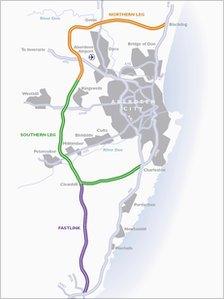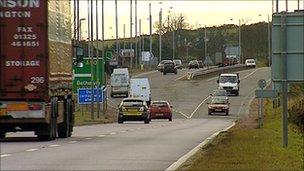Aberdeen bypass cost rises to £653m after delays
- Published

The Aberdeen bypass was given the go-ahead in 2009
The cost of the Aberdeen bypass has risen to an estimated £653m, it has been revealed.
The 28-mile road - previously predicted to cost £347m - was given the green light by Scottish ministers in 2009, but was delayed by legal action.
Protesters lost their appeal to the Supreme Court earlier this month.
Transport Minister Keith Brown said the "unwanted delays" had resulted in a "substantial increase" in the overall cost of the project.
William Walton from the protest group RoadSense, which spearheaded the legal challenge against the construction of the bypass, told BBC Scotland he believed the total cost could be even higher.
It is anticipated that construction will get under way in 2014, with completion by spring 2018.
In answer to a parliamentary question lodged by Aberdeen Central SNP MSP Kevin Stewart, Mr Brown said the scheme had been costed at £347m in 2008 - an estimate based on 2003 prices.
He said that the figure had now risen to £653m as a result of "scope changes, the inclusion of standard risk costs and rebasing to 2012 prices".
Mr Brown said inflation had been responsible for a £230m increase in the cost.

The aim is to make the A90 a dual carriageway between Balmedie and Tipperty
A scheme to make the A90 a dual carriageway between Balmedie and Tipperty in Aberdeenshire is also expected to cost £92m, giving a total of £745m for the combined project.
Mr Stewart criticised the added costs caused by the legal challenges.
He said: "Not only has an essential piece of infrastructure been delayed unnecessarily, but inflation has driven up costs.
"Now that the legal challenges have been exhausted, we can now move towards construction as quickly as possible."
Aberdeen City Council leader Barney Crockett said: "We realised that the cost of the AWPR (Aberdeen Western Peripheral Route) would be roughly what it now is and we have made adequate provision for that.
"The economic performance of the area will be underpinned by the AWPR."
'Major return'
Tom Smith, chairman of Aberdeen City and Shire Economic Future (Acsef) business development agency, said: "The delays caused by the legal challenges were always going to impact on the costs outlined in 2003.
"However, the economic and other benefits of the road are so significant that the cost will still represent a major return on investment for the public purse and people of the north east.
"The final mechanics of how they will be paid are still being worked out and there will be delicate negotiations between the Scottish government and our local authorities.
"But with the Scottish government paying 80% of the route and the total cost of the fast-link, the north east is getting a great deal in terms of investment in our woefully under-invested roads infrastructure."
- Published19 October 2012
- Published17 October 2012
- Published11 July 2012
- Published9 July 2012
- Published24 May 2012
- Published18 May 2012
- Published27 January 2011